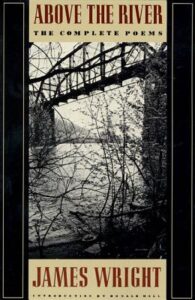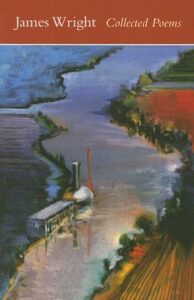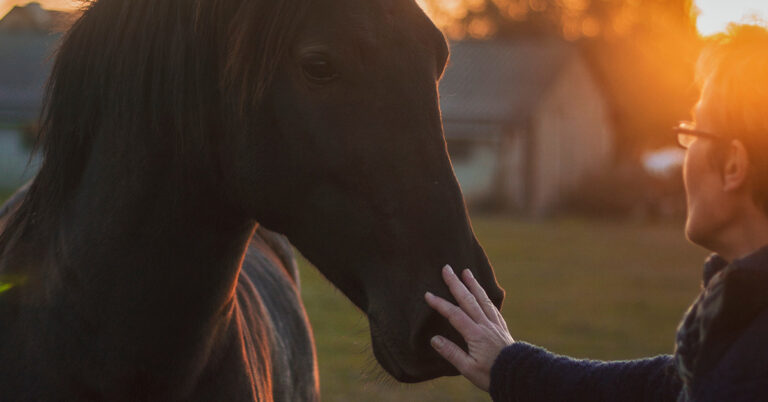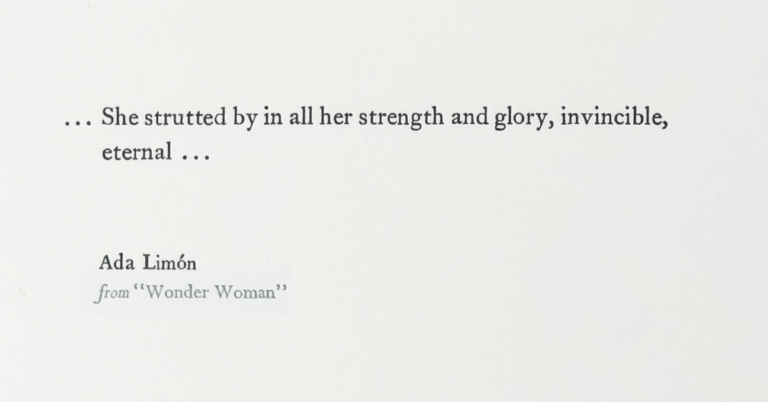James Wright
A Blessing
Is there a moment of beauty you can recall that’s like a blessing for you?
This poem takes place at twilight in a field just off the highway to Rochester, Minnesota, where the poet and a friend encounter two ponies who come “gladly out of the willows / To welcome my friend and me.”
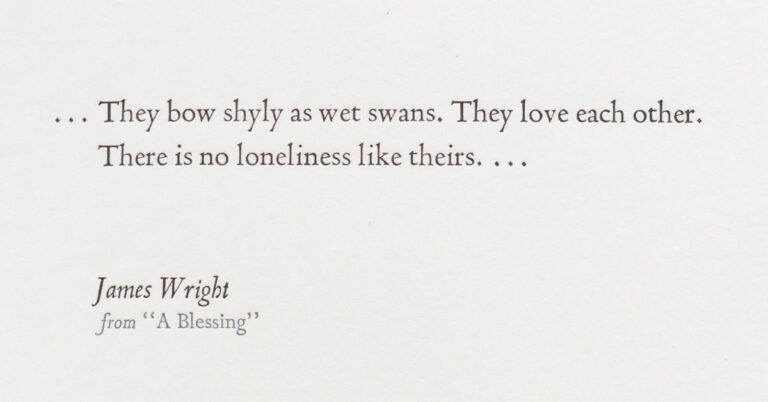
Image by Expedition Press/Expedition Press, © All Rights Reserved.
Guest
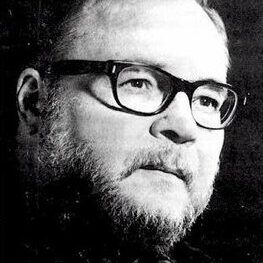
James Wright was a fellow of the Academy of American Poets and taught at he University of Minnesota, Macalester College, and New York City's Hunter College. He also served in the U.S. Army, and was stationed in Japan during World War II. His book Collected Poems received the Pulitzer Prize for Poetry. He died on March 25, 1980.
Transcript
Pádraig Ó Tuama, host: My name is Pádraig Ó Tuama, and I’ve loved nature poetry all my life but never been inclined to write it. I never felt like I had the tools. I grew up in the countryside, but in 2020 I’ve been living in the countryside, mostly, and I’ve been looking at nature and realizing that nature has its own work to do. It has its own economy; it has its own cycles. And it is present to itself, and I’m the lucky one to be watching it.
[music: “Praise The Rain” by Gautam Srikishan]
“A Blessing” by James Wright:
“Just off the highway to Rochester, Minnesota,
Twilight bounds softly forth on the grass.
And the eyes of those two Indian ponies
Darken with kindness.
They have come gladly out of the willows
To welcome my friend and me.
We step over the barbed wire into the pasture
Where they have been grazing all day, alone.
They ripple tensely, they can hardly contain their happiness
That we have come.
They bow shyly as wet swans. They love each other.
There is no loneliness like theirs.
At home once more,
They begin munching the young tufts of spring in the darkness.
I would like to hold the slenderer one in my arms,
For she has walked over to me
And nuzzled my left hand.
She is black and white,
Her mane falls wild on her forehead,
And the light breeze moves me to caress her long ear
That is delicate as the skin over a girl’s wrist.
Suddenly I realize
That if I stepped out of my body I would break
Into blossom.”
[music: “First Grief, First Air” by Gautam Srikishan]
Ó Tuama: I read this poem last year and was overwhelmed by it. I found it so emotional and so moving, and found so many layers to it. There are so many emotions, and there’s the presence of immense exuberance, as well as a certain kind of loneliness and sadness to it. And I thought the poem holds those together in something that’s so uplifting but that isn’t saccharine.
This poem is so specific about location. The first line is quite geographical, like you’re giving directions — “Just off the highway to Rochester, Minnesota.” And so this poem is located on Indigenous land, as well as with a highway coming through. So there’s this idea that some people speed along, and other people have never left. Other people have been forced away, and other people come there to visit. And the poem also sets the time — twilight. And I think this poem knows, and I think James Wright knew, that the readers might easily keep on grabbing this setting away from nighttime and force it into a daytime scene. So you might think of yourself being in a bright meadow with green grass and these gorgeous ponies coming over. , their eyes “[d]arken with kindness.” And they’ve been grazing all day, so the day’s over. And then they munch “young tufts of spring in the darkness.” So this poem is continually reminding us that it’s set at night, where the poet and a friend have gotten out of the car in the nearing dark, and they meet these two ponies.
And they’re not just two random ponies, because when they’re introduced, they’re introduced as “And the eyes of those two Indian ponies / Darken with kindness.” Look at the word “those” there, “those two Indian ponies.” Without the word “those,” we’d think this might be random. But it’s not. This seems to have been a journey with intention, like a pilgrimage. The poet and his friend have, I think, come here deliberately, in search of something, in the hope of meeting these two Indian ponies. And, perhaps, that’s where the title, “A Blessing,” comes in — they’re in search of a blessing, these two people, from these ponies.
[music: “The House You Wake In” by Gautam Srikishan]
There’s something about being trusted and liked and recognized by an animal, which is pure instinct, which is deep in its own primal belonging, that is profoundly moving. If anybody’s ever been in a situation where you feel trusted by an animal that doesn’t have to trust you, it is very tender. My dad has a friend who’s a robin. And the robin comes to the backdoor, every day — robins are very territorial, and dad is a great whistler. And so dad will always have the backdoor open and, if he’s in a conversation with anybody, he’ll tell them to be quiet, because, he’ll say, “Look, my friend’s there.” He’ll recognize the robin by its own sound, and he’ll whistle back. And the robin, these days, will literally come in. He sent us a photograph, the other day, of the robin sitting inside, on the frying pan, looking at him. It’s amazing. And there’s something magical, almost, about being visited by this animal that doesn’t need to visit you, doesn’t need to trust you, doesn’t need to seem like your space and its space needs to overlap. That seems to be the blessing, that it’s unnecessary and that it is not to be assumed or demanded. It has to be earned, with time and trust and trustability and gentleness.
[music: “First Grief, First Air” by Gautam Srikishan]
There’s this bit in the middle section that speaks of they, they, they. “They ripple tensely, they can hardly contain their happiness / That we have come. / They bow shyly as wet swans. They love each other. / There is no loneliness like theirs.” What an extraordinary middle section. It’s building into this beautiful description of beauty and nature right in front of you, and their interaction. And then that strange line, “There is no loneliness like theirs.” I think James Wright is highlighting that in the middle of a life of love, there’s always going to be the question of loneliness. I wonder, is he speaking about them, or is he really speaking about himself? I think he is speaking about himself, that in the midst of a life that has blessings like this, there’s always going to be the question of your own loneliness.
[music: “What Did You Not Hear” by Gautam Srikishan]
Ó Tuama: James Wright lived a sad life. He had complicated things going on in his life. He’s a poet from Ohio, he was a U.S. Army vet, and he knew a lot about what pain could be. And his poetry is filled with references to nature, as well as references to the machinations of war and the defense economy. And so his relationship with nature is one that hasn’t come from great ease in life, but that has come from a life that has seen many things and finds such nurture and blessing in encounter with nature.
The title here, “A Blessing,” doesn’t occur anywhere else in the poem, but yet, we see this strange blessing, where the pony seems to be the priest, pronouncing blessing on the poet. And the third-last and the second-last line read, “Suddenly I realize / That if I stepped out of my body I would break” — and if you stop there, you can see how beauty can sometimes be almost wounding. It can almost break you. You mightn’t know how to contain it. It’s that unbearable lightness. And how can the world, a world that James Wright knows can be cruel with war and abandonment, and lonely, how can this world be so beautiful? It breaks him. And it breaks him into blossom.”
[music: “Memoriam” by Gautam Srikishan]
Ó Tuama: I think there’s an invitation to consider. What are the tender blessings that are part of our day, and not one that just comes easily, but one that might have taken a long time to earn; tenderness from yourself, tenderness from some other piece of the environment, tenderness from an animal that you’ve had to earn their trust? And to see that blessing isn’t just something that happens only in a religious context or happens as a rote, but rather is something that happens as a great visitation of something ordinary that holds something extraordinary — that can almost break you, it’s so beautiful.
“A Blessing” by James Wright:
“Just off the highway to Rochester, Minnesota,
Twilight bounds softly forth on the grass.
And the eyes of those two Indian ponies
Darken with kindness.
They have come gladly out of the willows
To welcome my friend and me.
We step over the barbed wire into the pasture
Where they have been grazing all day, alone.
They ripple tensely, they can hardly contain their happiness
That we have come.
They bow shyly as wet swans. They love each other.
There is no loneliness like theirs.
At home once more,
They begin munching the young tufts of spring in the darkness.
I would like to hold the slenderer one in my arms,
For she has walked over to me
And nuzzled my left hand.
She is black and white,
Her mane falls wild on her forehead,
And the light breeze moves me to caress her long ear
That is delicate as the skin over a girl’s wrist.
Suddenly I realize
That if I stepped out of my body I would break
Into blossom.”
[music: “Praise The Rain” by Gautam Srikishan]
Lily Percy: “A Blessing” comes from James Wright’s book Above the River. Thank you to Wesleyan University Press who gave us permission to use James’ poem. Read it on our website, at onbeing.org.
Poetry Unbound is Chris Heagle, Erin Colasacco, Serri Graslie, Eddie Gonzalez, Lilian Vo, Christiane Wartell, Karen Navarre, Karyn Towey, Sue Ariza, and me, Lily Percy. Our music is composed and provided by Gautam Srikishan and Blue Dot Sessions. This podcast is produced by On Being Studios, which is located on Dakota land. We also produce other podcasts you might enjoy, like On Being with Krista Tippett, Becoming Wise, and This Movie Changed Me — find those wherever you like to listen or visit us at onbeing.org to find out more.
Books & Music
Recommended Reading
The On Being Project is an affiliate partner of Bookshop.org and Amazon.com. Any earnings we receive through these affiliate partnerships go into directly supporting The On Being Project.





